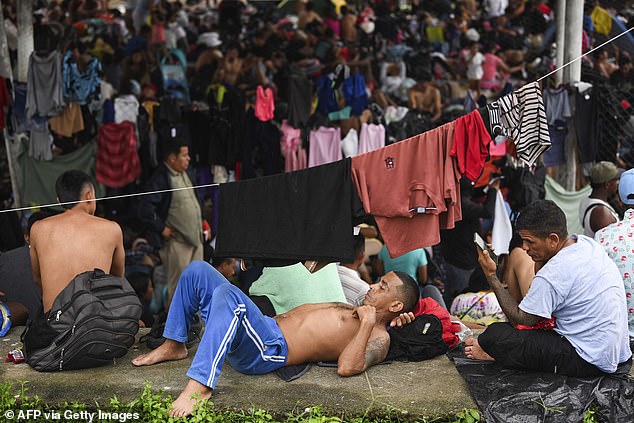How drama over illegal immigrants voting in the election could launch the government into SHUTDOWN
Congress returns to Washington DC next month to resolve another major spending issue, and the House Freedom Caucus is ready with its tough demands.
Lawmakers must extend funding to all government agencies by September 30 or the government will shut down.
Complicating matters further, the approximately 50-member ultraconservative Freedom Caucus is demanding that any deal to reauthorize spending include a ban on illegal immigrants voting.
They specifically want to add a conservative law, the SAVE Act, that would require proof of citizenship to vote in the presidential election.
But the bill’s inclusion would outrage Democrats, who would never support such legislation.
And because Republicans have a slim majority and need all GOP members (including the Freedom Caucus) to vote for a spending package, a government shutdown is all but certain.
Congress will face another major spending problem in November, and the House Freedom Caucus is ready with its tough demands
“The House Freedom Caucus believes that House Republicans should return to Washington to continue the work of passing all 12 budget bills to reduce spending and advance our policy priorities,” the group said in a new policy statement.
“Additionally, the continuing resolution should include the SAVE Act — as called for by President Trump — to prevent noncitizens from voting to preserve free and fair elections in light of the millions of illegal aliens imported by the Biden-Harris administration over the past four years.”
They fear that migrants will vote for Kamala Harris in the upcoming elections, which would give the Democratic candidates a boost.
As a result, Republicans are pushing the SAVE Act, which would force election officials to verify citizenship in elections. The bill has already passed the House, with the help of just five Democrats, but would surely die in the Senate.
The bill would close loopholes that allow people to register to vote without proof of U.S. citizenship or photo ID. It would also require all 50 states to remove illegal immigrants from their voter rolls. It would also impose penalties of up to five years in prison for election officials who register noncitizens to vote, and require proof of citizenship for people who vote abroad.
Most ballots require some form of ID to register to vote, such as a driver’s license. Not all IDs require citizenship — the bill would specifically require IDs such as passports or birth certificates.
While it is extremely rare for illegal immigrants to vote in elections, Virginia Governor Glenn Youngkin recently announced that thousands of people have tried to register in his state, raising fears.
The Republican said Virginia purged about 6,000 illegal immigrants from voter rolls between 2022 and 2024. Last week, he signed an executive order to prevent them from registering to vote.
As has become common practice, it seems all but inevitable that Congress will miss the government funding deadline and require a temporary extension of funding at 2024 levels.
The short-term solution to keep the government running is called a “continuing solution” (CR).
The Freedom Caucus agrees with the CR and believes a short extension could push the funding deadline to the next term, when they hope Donald Trump will be president.

Migrants, mainly from Central America and Venezuela, rest on their way to the United States to escape poverty and violence on the outskirts of Huixtla, Chiapas state, Mexico.
But it’s a risky move. The House could fall into Democratic hands at that point.
Other mainstream Republicans have urged the House to move forward with passing 12 separate budget bills, one for each government agency.
The House has passed six budget bills, but scrapped plans to vote on others after running into policy differences.
The Senate has not passed any. Even if both houses passed all 12 bills, they would still have to come together and negotiate 12 bills that could get a majority in both houses.
